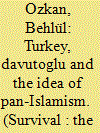| Srl | Item |
| 1 |
ID:
079087


|
|
|
|
|
| Publication |
2007.
|
| Summary/Abstract |
This article analyses the nature of the current Russian system and its future trajectory. First, the continuity between the Yeltsin and Putin presidencies is made clear. The nature of the Russian system has, to a great extent, been influenced by Yeltsin, who strengthened demands not for independent institutions but for a new and more powerful authoritarian leadership. Putin has consolidated the system, based on personalized power. But despite signs of economic growth and outward stability there is evidence that the Russian system is unsustainable in the long-term. The current system is based on a modification of the petro-economy that reproduces the merger between power and business with the rentier class. Thus far, however, the model has not been able to solve social conflicts or stop the degradation of 'human capital'. Nor is it likely to do so in the future
|
|
|
|
|
|
|
|
|
|
|
|
|
|
|
|
| 2 |
ID:
132472


|
|
|
|
|
| Publication |
2014.
|
| Summary/Abstract |
Turkey's foreign minister was the first intellectual to devise a rationalistic and pragmatic Islamist foreign policy. Five years in office have exposed a huge gap between his ambitions and the country's ability to achieve them.
Over the past decade, Turkey's foreign policy has been synonymous with Ahmet Davutoglu and his doctrine of 'stratejik derinlik' (strategic depth). In 2010-11 he was on Foreign Policy's list of the 'Top 100 Global Thinkers'. Yet, despite this popular interest in Davutoglu, there are few academic studies of his foreign policy. He devised Turkey's current, pan-Islamist approach in his work as an academic during 1986-2002, detailing his vision in hundreds of articles published in that period. Davutoglu consistently argued that the end of the Cold War provided Turkey with a historic opportunity to become a global power, as long as it followed an expansionist foreign policy based on Islamist ideology. According to Davutoglu, Turkey was to dominate its hinterland - the Middle East, the Balkans and the Caucasus - and thereby create a new Lebensraum (he uses the Turkish words 'hayat alani', which is a direct translation of the German Lebensraum, or 'living space'). He began to turn his pan-Islamist vision into reality after 2002, following his appointment as foreign-policy adviser to the ruling Justice and Development Party (AKP), a position he held until he was made foreign minister in 2009.
|
|
|
|
|
|
|
|
|
|
|
|
|
|
|
|